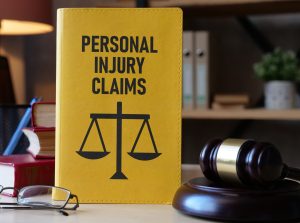If you suffered a work-related injury, you may wonder if you qualify for accident at work compensation. This article examines accident at work claims.
There are specific workplace accident claims criteria you need to meet in order to claim compensation. We discuss this as well as look at the claims procedure you need to follow. Additionally, we look at how compensation is awarded in successful claims.
You will also be expected to submit compelling evidence that proves liability for the injuries you sustained. This article will look at examples of evidence that could be useful when making an accident at work claim. We’ll also look at the time limits that must be adhered to when making a personal injury claim.
If you are eligible to make a compensation claim, you may want to instruct a solicitor to work on your case. A specialist workplace accident solicitor could provide their services on a No Win No Fee basis. We conclude this article with a look at the benefits of having the support of a No Win No Fee solicitor.
If you have any questions or would like to find out if you are eligible to make a claim, please contact a member of our advisory team. To discuss claims for accidents at a workplace:
- Request a call back by filling in our claim online form.
- Call 020 8050 2736
- Ask your questions about workplace accidents in our live chat.
Select A Section
- What Are My Rights After Having An Accident At Work?
- What Should I Do After An Accident At Work?
- How Much Accident At Work Compensation Could I Receive?
- What Do I Need To Prove To Make An Accident At Work Claim?
- What Is The Claims Procedure For An Accident At Work Claim?
- How Long Do I Have To Claim Accident At Work Compensation?
- Can I Make A No Win No Fee Claim For Accident At Work Compensation?
- More Resources About Claiming For An Accident At The Workplace
What Are My Rights After Having An Accident At Work?
While you are at work, your employer must take all reasonably practicable steps to ensure your health, safety and welfare. This is their duty of care as per the Health and Safety at Work etc. Act 1974 (HASAWA). There may be specific health and safety regulations dependent on the nature of your job and type of workplace.
Following an accident at the workplace, you may wonder if you are entitled to compensation. In order to make a claim for accident at work compensation, you must satisfy the personal injury claims eligibility criteria. You must have evidence that proves that:
- Your employer owed you a duty of care.
- They breached this duty.
- You suffered a psychological injury and/or a physical injury, such as a hip injury, as a result of this breach.
Later on in this guide, we’ll look at what evidence could help your workplace injury claim.
What Should I Do After An Accident At Work?
There are some steps you may like to take following a workplace accident. Some of these could help your claim for accident at work compensation, should you wish to file one. They include:
- Reporting the incident to your employer. The accident book may need to be filled in. An accident book is required by law for any workplace with ten or more staff members. This should be filled in with your name, the time and date and any relevant details of the incident. Your employer may also have to report certain incidents to the Health and Safety Executive (HSE). The HSE monitor health and safety and investigate workplace accidents.
- Seek medical attention. This will generate medical records of your injury, which could be useful if you decide to claim.
- Make your own notes of the incident. You may want to make a note of the contact details of anyone who saw the accident, information about your injuries, or take some photographs.
These steps can still be taken following most workplace accidents, even if they weren’t taken in the immediate aftermath.
Do I Get Paid If I Get Injured At Work?
Some places of employment have a sick pay scheme. You would need to check your contract to find out if you are entitled to this. Additionally, you might be entitled to claim Statutory Sick Pay (SSP).
You may also be eligible to claim for your loss of earnings as part of a personal injury claim. This can be the full loss plus pension contributions, the difference between sick pay and your normal pay, or statutory sick pay and your normal pay. We will explain more about this in the next section.
How Much Accident At Work Compensation Could I Receive?
When a claim for accident at work compensation is successful, the settlement might consist of two parts. These are called general and special damages.
To compensate for the physical and mental damage, you will be awarded general damages. To help arrive at a figure for general damages, those with the responsibility of valuing claims may refer to the compensation guidelines published by the Judicial College (JCG). These guidelines are for different injury types.
Our table below looks at a few figures from the JCG 16th edition. In addition to these figures, we provide an amount in the top row. This figure was not taken from the JCG. Due to the differences between claims, this table is provided for guidance only.
| Injury | Severity | Notes | Guideline Compensation Amount |
|---|---|---|---|
| Multiple Very Severe Injuries and Special Damages | Very Serious | Settlements may include compensation for more than one injury that is serious in nature and special damages, including lost wages and medical expenses. | Up to £1,000,000+ |
| Brain Damage | Very Severe | Injured parties will suffer severe disabilities of both cognitive and physical varieties that will require full time nursing care. | £282,010 to £403,990 |
| Leg Injuries | Amputations (i) | Both legs have been amputated either above the knee or one amputated above the knee with the other below. | £240,790 to £282,010 |
| Back Injuries | Severe (i) | The claimant will be in severe pain and suffer disabilities, such as incomplete paralysis, impairments to their sexual function or their bladder and bowel. | £91,090 to £160,980 |
| Neck Injuries | Severe (i) | Neck injuries in this bracket are associated with incomplete paraplegia, permanent spastic quadriparesis or little to no neck movements and severe headaches. | In the region of £148,330 |
| Injuries to Hips and Pelvis | Severe (i) | Injuries in this bracket result in substantial residual disabilities that may include lack of bladder and bowel control, hip deformity and sexual dysfunction. | £78,400 to £130,930 |
| Arm Injuries | Severe | The claimant's injuries are extremely serious to the point that they are little better off than had the arm been amputated. | £96,160 to £130,930 |
| Foot Injuries | Severe | Included in this bracket are injuries to both feet that cause substantial mobility restrictions or considerable permanent pain, or unusually severe single foot injuries, such as severe degloving. | £41,970 to £70,030 |
| Ankle Injuries | Severe | Significant residual disability is found in these types of ankle injuries, such as instability and limited ability to walk. | £31,310 to £50,060 |
| Wrist | Significant | The wrist will retain some useful movement, but the injury causes significant permanent disability. | £24,500 to £39,170 |
Special Damages In An Accident At Work Claim
You may also be awarded special damages as part of your accident at work compensation. This is to reimburse you for any out-of-pocket expenses you suffered due to the injury. You could be reimbursed for:
- Your loss of earnings.
- Medical expenses, including therapy and prescriptions.
- Home help, which could include a carer, cleaner, childcare or any other outside help you required while recovering from your injuries.
- Adaptions to your home, including items such as a ramp installation or railings in the shower.
To recover financial losses as part of your case, you should save evidence to submit later in the personal injury claims process. For example, any receipts or invoices for items purchased to cope with your injuries as well as your wage slips.
An advisor from our team can advise you on how much compensation you might be eligible for.
What Do I Need To Prove To Make An Accident At Work Claim?
You may wonder what evidence is needed for a personal injury claim. All compensation claims need to be supported with compelling evidence that proves liability for your injuries. Here is a list of potential evidence that could support claims for work injury compensation:
- Medical evidence. You can request a copy of your medical records with treatment details.
- Witness contact details. If you note contact information, witness statements can be taken later in the accident at work claims process.
- Accident at work book. As discussed earlier in this article, a copy of the accident book can be submitted.
- Accident footage. For example, you can request CCTV footage of yourself.
If you would like to discuss what you could submit to support your claim for accident at work compensation, please contact a team member.
What Is The Claims Procedure For An Accident At Work Claim?
In order to make a claim for accident at work compensation, you need to follow the Pre-Action Protocol for Personal Injury Claims. Steps that need to be taken include:
- Letter of Notification. This informs the defendant that a claim is likely to be made.
- Rehabilitation. Both parties should determine what medical treatment is required as soon as possible.
- Letter of Claim. This is the formal notification that a personal injury claim is being made against the defendant. It should include a concise summary of the facts that form the basis of the claim.
- Response. The defendant has to respond to the Letter of Claim in 21 days and investigate the case (3 months).
- Disclosure. Disclosing documents are meant to provide clarity on dispute points or aid in the resolution of these.
- Experts. Both parties may instruct relevant experts to provide testimony on the points of claim. For example, medical professionals or an engineer.
- Negotiations following admission. If a defendant accepts liability, an offer can be made to settle before court proceedings.
- Alternative Dispute Resolution (ADR). The legal representatives of both parties will try to settle out of court. If this fails, the claim will then go to trial.
You can instruct a personal injury solicitor to help you with your claim. The solicitors from our panel offer these services on a No Win No Fee basis. Contact a member of our advisory team to find out more.
How Long Do I Have To Claim Accident At Work Compensation?
If you would like to seek accident at work compensation, it is vital that you begin the claims process before the time limit expires. In general, personal injury claims must be started within three years of the date of the accident as set by the Limitation Act 1980.
However, in certain circumstances, time limit exceptions apply when making a compensation claim. These include:
- Those without the mental capacity to manage the civil procedure. The time limit is suspended for as long as the injured person does not have this mental capacity. The court may appoint a litigation friend to manage the claims process at any point during this suspension. However, if the injured person regains the capacity needed to claim and one was not started for them, they will have three years from the date they recovered this capacity to file one.
- Those below the age of 18 at the time of the workplace incident also cannot manage their own claim until their 18th birthday. Prior to this, a litigation friend could be appointed to handle the civil procedure for them. However, if the injured party turns 18 and a claim was not filed for them, they will have three years from their 18th birthday to begin the claims process.
Can I Make A No Win No Fee Claim For Accident At Work Compensation?
If you are eligible to seek accident at work compensation, you may like to instruct a solicitor to support you through the claims process. One of the solicitors from our panel could help you with your case. If you are worried about the financial risk, generally, the personal injury solicitors from our panel represent claimants under a Conditional Fee Agreement (CFA). This is a kind of No Win No Fee agreement.
If your solicitor offers to represent you under a CFA, they won’t take a payment for their services upfront. There also won’t be any ongoing costs. However, if your work injury case is successful, your solicitor will take a success fee from your award. This amount is a legally limited percentage. This fee is not payable if your claim fails.
Our team members are available to advise you on your accident at work and how to claim 24/7. If you meet the eligibility criteria, they can also connect you to one of the solicitors from our panel.
To find out if you have a valid claim:
- Call 020 8050 2736 to see if you could make a No Win No Fee accident claim.
- Fill in our claim online form and an advisor will get back to you.
- Connect using our live chat to discuss making a workplace accident claim.
More Resources About Claiming For An Accident At The Workplace
Here are a few additional accidents at work claim guides:
- Information about preventing an accident in the workplace and how workplace injuries happen.
- Guidance on whether your employer can sack you after an accident at work.
- Read about how long you have to claim for a workplace injury.
A few external websites that might help you:
- Information on worker health and safety published by the Health and Safety Executive (HSE).
- Guidance on first aid published by the National Health Service (NHS).
- Details on when to call 999 from the NHS.
Please direct any further questions about accident at work compensation to an advisor.







